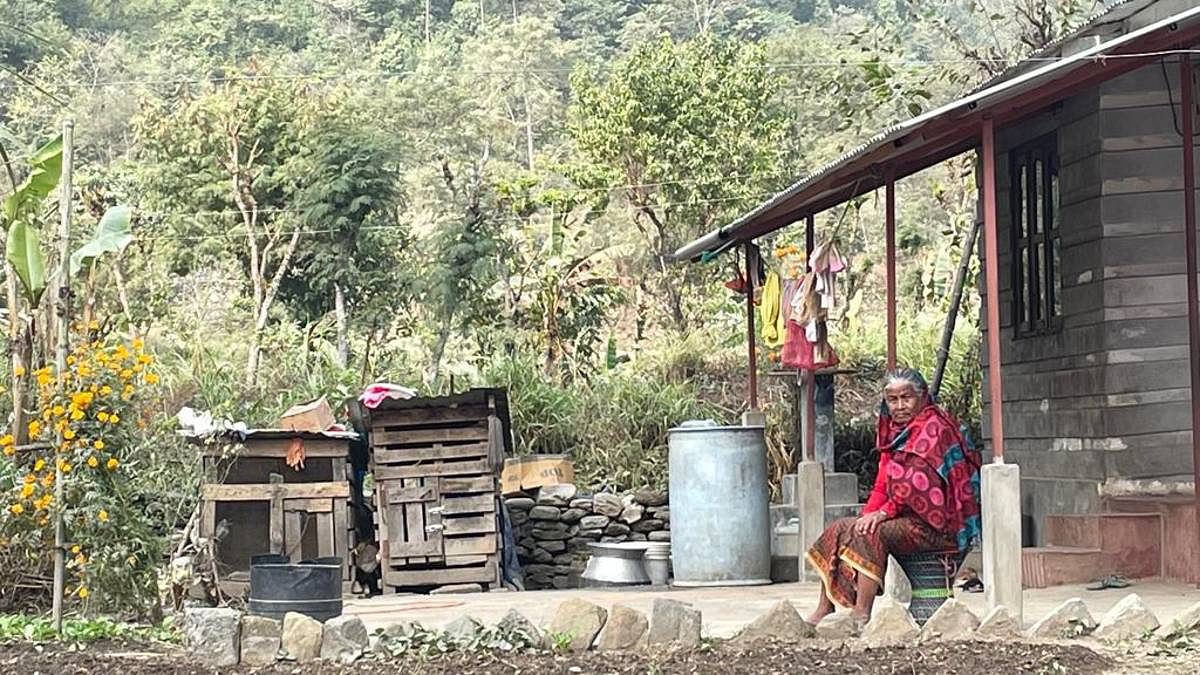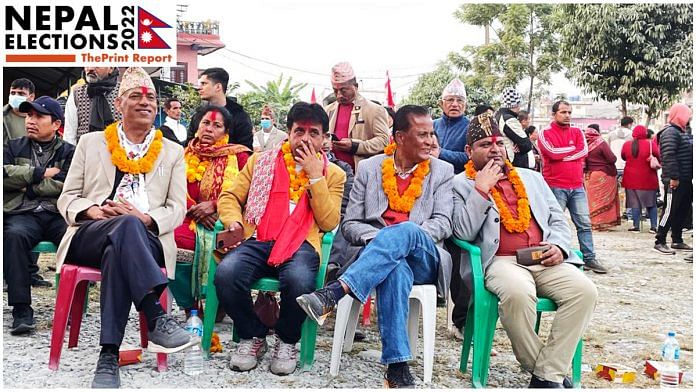Pokhara: On the banks of the exquisitely beautiful Fewa Lake, in Nepal’s Pokhara, a young activist of the ruling Nepali Congress (NC) was explaining to ThePrint why his own party’s alliance with the Maoist Centre led by Pushpa Kamal Dahal or Prachanda as he is more commonly known, is likely to backfire when Nepal votes on 20 November.
The activist, speaking on condition of anonymity, insisted that his grievances against his political party are like an underground wildfire that is raging across Nepal’s seven provinces.
“When Maoist cadres participated in the decade-long insurgency in Nepal between 1996 and 2006, they especially targeted Nepali Congress activists and their families. Many were killed, many others maimed for life. How do you expect NC cadres to forgive and vote for these ex-Maoists just because our parties are in alliance?” he asked.
In front of us, the Fewa Lake’s silver waters ripple quietly in the afternoon sun – presumably they run deep.

In three days, Nepal will vote to choose a new federal government as well as legislative assemblies in seven provinces. The ruling party alliance, led by Nepali Congress leader Sher Bahadur Deuba, is fighting to retain power against the opposition alliance led by Left-wing leader and former Prime Minister K. P. Sharma Oli — but the race is both tight and uncertain, because of rising popular disillusionment against traditional parties.
Certainly, all doesn’t seem well in Deuba‘s party. Deuba’s refusal to give tickets to worthy candidates like sitting MPs Amresh Singh and Minendra Rijal — they are fighting the elections as independents — besides the Harvard-educated economist Swarnim Wagle, has caused a great deal of inner-party discontent.
Besides, Deuba doesn’t seem to have shown the Nepali Congress’ main dynasty, the Koiralas, the due they believe they deserve.
There’s a fourth reason which the NC activist quoted above and several others from the party only speak about sotto voce — the rising influence in the party of Deuba’s wife, the highly articulate, very smart and capable, Arzu Rana Deuba.
Her critics, none of whom want to be named, described her as a cross between Eva Peron and Indira Gandhi, a woman with a strong will and vaulting ambition. Those who like her, who also don’t want to be quoted, say that in Nepal’s de-ideologised landscape today, you need a woman like her to set the agenda, even if it is more or less from behind the scenes.
The First Lady herself put paid to the rumours, when earlier this week she told podcaster Sanjay Silwal Gupta, that she certainly “had the qualifications, the experience” to become Nepal’s first female prime minister. She conceded, that in politics, “it’s a game of numbers. First you have to win the election, then you have to stand in the parliamentary committee and win the election of the parliamentary leader,” and in the current situation, also win the five-party coalition.
“There is no doubt that I can beat any man hands down, because I’ve always topped the universities where I’ve studied, I have the experience… But the big question is, will Nepalese men digest me, it’s a very patriarchal society,” Arzu said.
“It’s difficult, but not impossible,” she added, “but not right now”.
Certainly, the lady is a determined politician. Used to being in the public eye — Arzu is a direct descendant of the Rana dynasty which ruled Nepal for roughly a hundred years between 1846 and 1951, when it had to cede back power to the Shahs — she came to the fevered notice of the Nepali media when she tied a rakhi on Vijai Chauthaiwale’s wrist in August last year, when the head of Bharatiya Janata Party’s (BJP) foreign affairs cell, was visiting Nepal.
That was certainly a politically smart move to make on behalf of her husband, the Prime Minister. Chauthaiwale is seen to be close to both Indian Home Minister Amit Shah and certainly Prime Minister Narendra Modi, and is believed to have been given charge of Nepal after RSS leader Ram Madhav’s star began to fade when Modi came to power for a second time in 2019.
India is known to keep a close watch on all the goings-on in Nepal, with an open border, fraternal relations between the two armies, more-than-comradely support for democratic dispensations and ancient cultural and religious ties defining this very special relationship.
In July, when Arzu visited Delhi for medical reasons, Chauthaiwale tweeted about his meeting with her.
Happy to meet Dr Arzoo Rana Deuba after a gap of six months in New Delhi. pic.twitter.com/4grOtOm8vE
— Dr Vijay Chauthaiwale (@vijai63) July 27, 2022
Also read: In Kathmandu, leaders compete to be ‘different’, make & break ties, as Nepal voters ‘seek change’
India-Nepal ties
Last year’s rakhi-tying event in Baluwatar, the official home of Nepal’s prime ministers, came in the wake of considerable political chaos that has recently roiled Nepal.
In May last year former Nepal PM and Leftist leader K.P. Oli failed to win a vote of no-confidence in Parliament. President Bidya Devi Bhandari — seen to be partial to Oli’s grouping — however, denied the Deuba-led alliance the chance to form government and opted instead to dissolve the House.
Two months later, Nepal’s Supreme Court ruled that the President’s decision was unlawful and ordered that Deuba be made PM.
Arzu Rana Deuba accompanied the return of her husband to Baluwatar for the fifth time.
It had been a tough previous few years for the Nepali Congress, since the party was trounced in the 2017 elections by the coming together of Nepal’s main Communist parties, who won on an anti-India platform.
Oli’s relationship with India had deteriorated rapidly in this period when he laid claim to territories held by India — from Limpiyadhura to Kalapani and Lipulekh, also near the India-China border — amended the Constitution and changed the maps. In a state of heightened nationalist fervor that followed, the Nepali Congress, traditionally seen to be close to India’s mainstream parties, went along, as did other parties in the House.
In the podcast earlier this week, Arzu also asserted that her husband is a “master at the game” of politics and that she doesn’t know even “10 per cent of what he knows”.
The fact that she lost the Kailali constituency in the 2017 election is proof, as is the fact that she learnt from that defeat to play safe as she formally enters politics. This time around, she’s contesting in the Proportional Representation list, thereby ensuring herself a seat in Parliament and likely enhanced influence.

But the big question in Kathmandu’s bazaars these days is whether Arzu is tired of arranging the flowers and supervising the laying of the dining table in Baluwatar and whether her ambition will see the light of day after this election. Certainly, as far back as the early 1990s, Arzu had come to the notice of then US ambassador to Nepal Julia Chang Bloch, who is believed to have played match-maker between her and the rising star in Nepali Congress politics, Sher Bahadur Deuba.
In the shadows of the Koiralas for a few years, Deuba has emerged as a formidable player by allying with every main political formation in Nepal in order to become PM, including both Prachanda’s Maoists as well as K.P. Oli. The Koiralas remain estranged in their stronghold in Biratnagar.
Under the circumstances, Deuba’s wife’s connections across Kathmandu’s elite have certainly helped pave the way for her husband to climb the political ladder. But as she tramps the country these last few hours on the election campaign trail, can she help transform Nepal’s current, urban disenchantment with traditional politics and politicians and turn it towards the Nepali Congress-led coalition?
As the NC activist in Pokhara pointed out, asking Nepali Congress cadres to transfer their votes to ex-Maoist cadres and vice-versa is a tall order. Deuba’s NC and Prachanda’s Maoist Centre have shared power before, but the former political enemies have never gone to the hustings together.
It will soon be time to vote. As Nepal goes to the polls, the imagined — or otherwise — influence of Arzu Rana Deuba will surely be one factor among the many which turn the tide. It is likely to be an important one.
(Edited by Poulomi Banerjee)
Also read: ‘Shape up, or ship out’—why Nepal’s young politicians are challenging an ageing establishment



